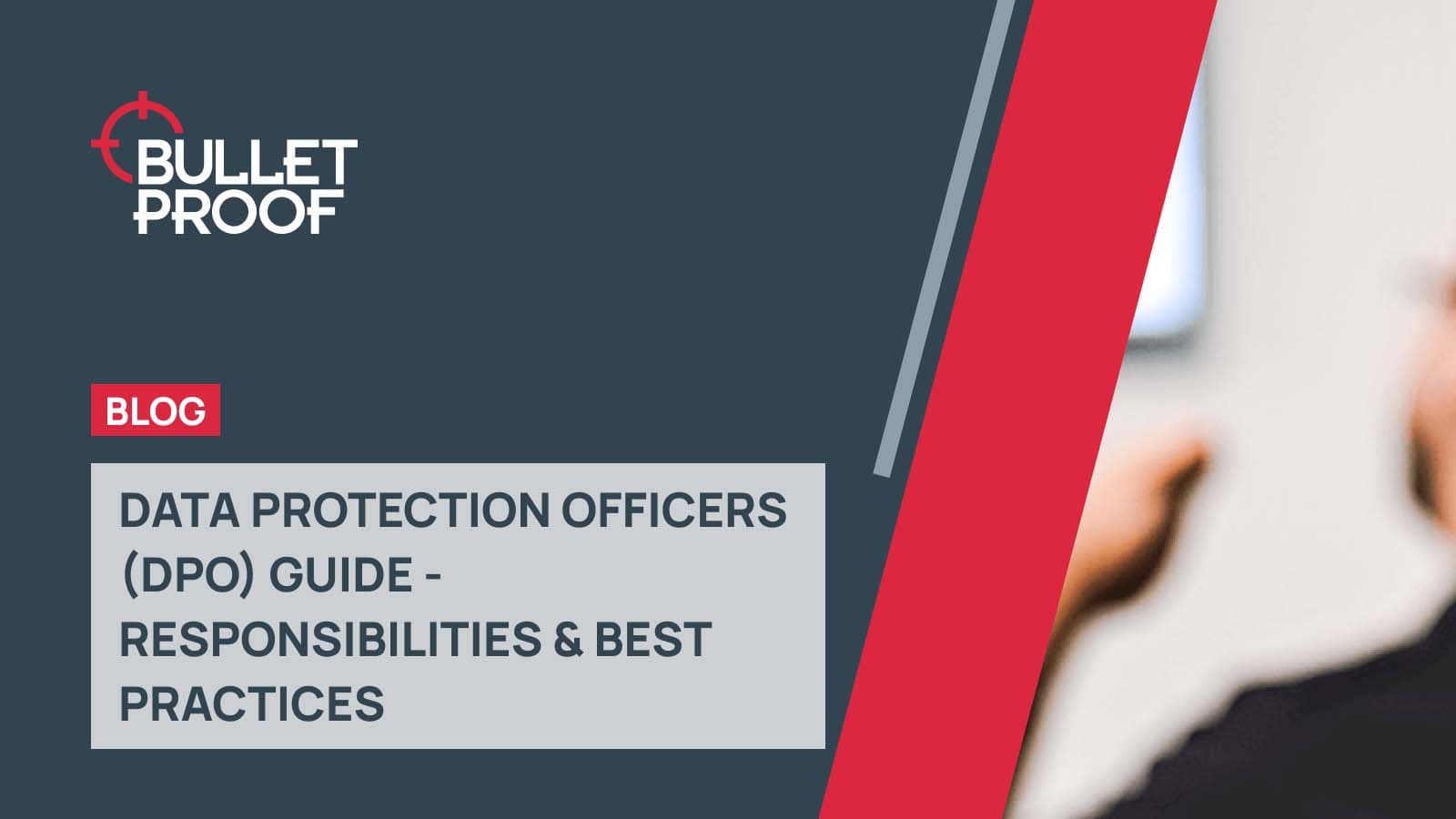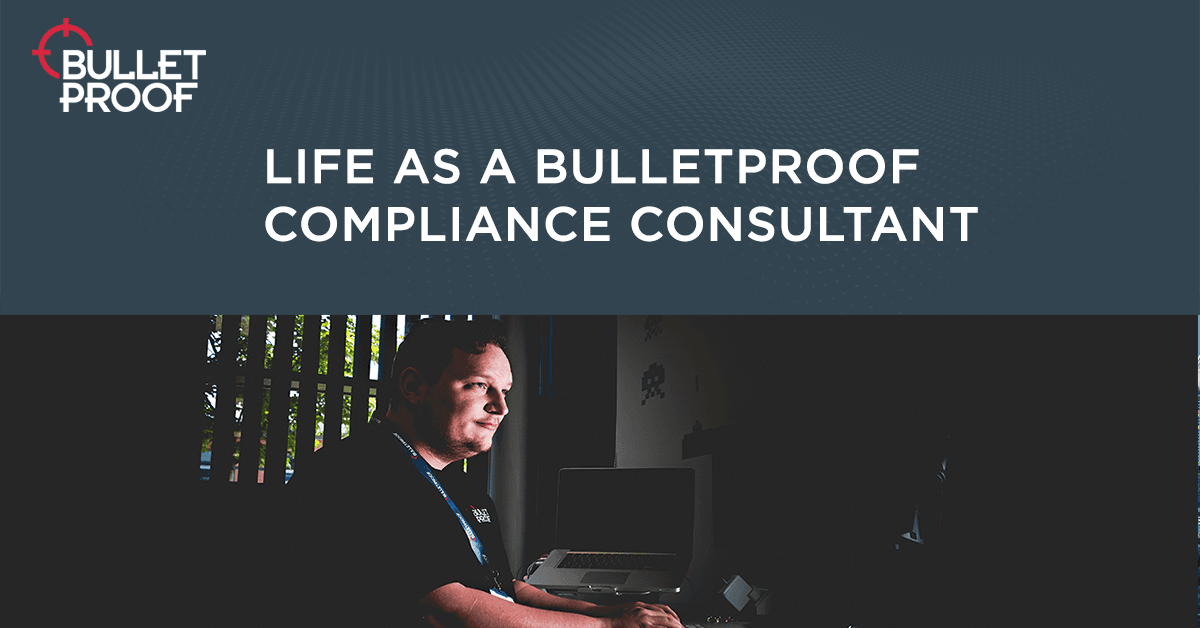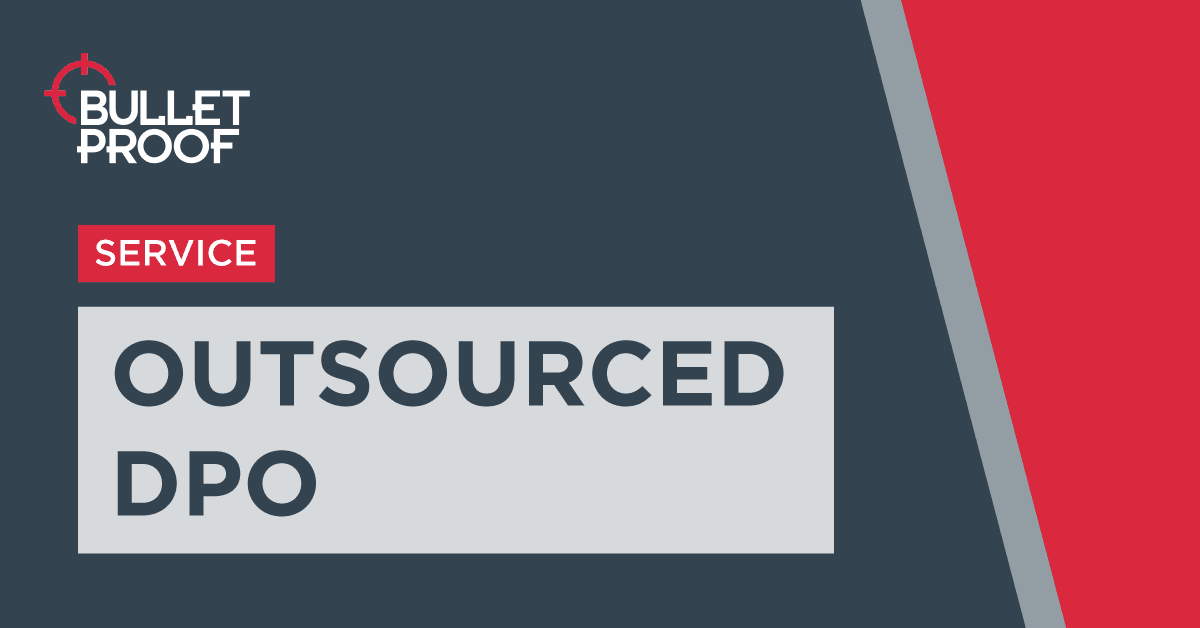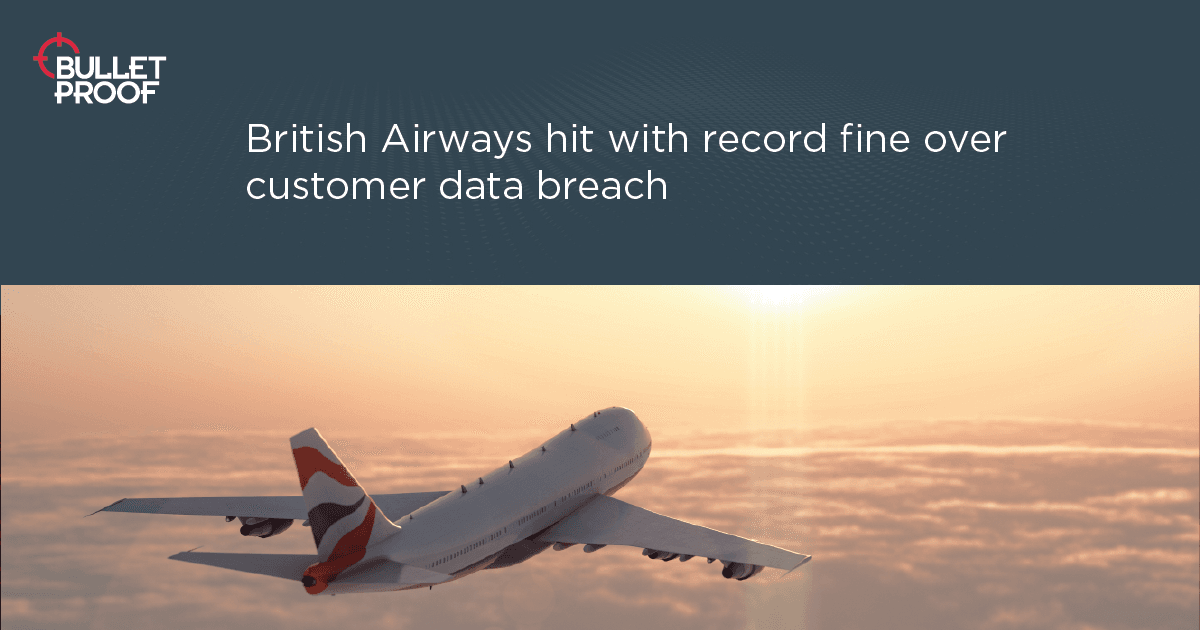Data Protection Officers (DPO) Guide Responsibilities & Best Practices
Appointing a Data Protection Officer makes information security a lot easier and reduces the risk of costly fines. But what is a DPO and what do they do?

What is a data protection officer?
A Data Protection Officer (DPO) is responsible for overseeing a company’s processing of personal data, ensuring compliance with relevant data protection laws such as the UK GDPR or EU GDPR. Acting as a bridge between your organisation, data subjects, and regulatory authorities like the ICO, the DPO ensures that robust data protection strategies are implemented to safeguard personal data and uphold the rights of individuals. Their role includes monitoring compliance, conducting risk assessments, and advising on best practices for data protection.
While the concept of a DPO predates the General Data Protection Regulation (GDPR) , the introduction of GDPR placed greater emphasis on securing personal data and ensuring accountability. Data subjects (i.e., individuals whose personal data is being processed) are now more aware of their rights and how to exercise them, making the role of the DPO increasingly essential in modern organisations.
Share this Article
What does a data protection officer do?
A Data Protection Officer’s (DPO) role is varied, encompassing many day-to-day tasks that ensure robust data protection strategies are in place and aligned with relevant regulations. Key responsibilities include:
The DPO’s responsibilities have expanded significantly in recent years to address the challenges posed by emerging technologies and regulatory scrutiny. For instance:
AI and Advanced Data Analytics: DPOs are increasingly involved in overseeing compliance with AI technologies, ensuring that organisations applying aspects such as Data Protection by Design to these new and exciting technologies.
Regulatory Focus: In 2023, the European Data Protection Board (EDPB) launched enforcement actions to assess the designation, independence, and role of DPOs in various organisations, reinforcing the importance of this role in modern data protection frameworks.
It’s important to note that, while a DPO provides advice and guidance on GDPR compliance, the ultimate responsibility for compliance lies with the data controller or data processor. These entities remain liable in the case of non-compliance, not the DPO.
Does my company legally need a DPO?
Since the introduction of GDPR, certain companies are legally required to appoint a Data Protection Officer (DPO). Your business must have a DPO if:
You are a public authority or body
Public authorities and bodies are legally required to appoint a DPO. Examples include schools, hospitals, local governments, and other publicly owned organisations.
Your core activities involve large-scale, regular, and systematic monitoring of individuals
This includes activities such as tracking and profiling individuals. For example:
Using CCTV for surveillance.
Retailers monitoring customer searches to deliver targeted advertisements.
Your core activities involve the large-scale processing of special category data
Businesses processing special category data must appoint a DPO. Special category data includes:
Genetic data
Trade union membership
Health information
Sexual orientation
Race or ethnicity
Political opinions
Identifiable biometric data
If you don’t meet these criteria
Even if your business doesn’t fall under the above categories, you are still responsible for managing and protecting public data. Appointing a DPO is strongly recommended, as it ensures you remain compliant with data protection laws and better prepared to handle any data-related enquiries or breaches.
What rights do data subjects have?
GDPR significantly expanded the rights of data subjects, granting them greater control over their personal data and leading to an increase in the number of requests a DPO might receive. Under GDPR, individuals in the EU have the following rights:
The right to be informed
Data subjects are entitled to specific information about your data processing activities, including:
How their data is processed.
How long it will be retained.
Their rights under GDPR.
The right to lodge a complaint with a supervisory authority.
This information should be outlined in a clear, well-written privacy notice.
The right of access
Data subjects can request confirmation of whether their data is being processed and, if so, obtain a copy. Companies must:
Provide the data within 30 days of receiving the request.
Deliver the information in a clear and easily accessible format.
Fulfil the request free of charge, unless it is excessive or repetitive.
The right of rectification
If a data subject’s information is incorrect or incomplete, they have the right to request corrections or updates.

Data subjects have the right to request any data you hold on them.
The right to erasure (right to be forgotten)
Data subjects can request their personal data be erased from all platforms if:
The data was processed unlawfully.
The data is no longer needed and there is no legal purpose for retaining it.
Consent to processing has been withdrawn (assuming consent was the legal basis).
They object to processing and there are no overriding legitimate grounds.
The right to restrict processing
Data subjects can request that their data is no longer processed if:
The data is inaccurate.
The data is no longer needed but must be retained for legal purposes.
They have requested data erasure, and the request is being processed.
While processing must cease, the data can still be stored during this time.
The right not to be evaluated based on automated processing
GDPR allows users to object to decisions made solely through automated processing if these decisions have a significant impact (e.g., job applications, credit approval).
The right to object
Data subjects can object to the processing of their data at any time if:
There is no legitimate need for processing.
Processing is based on consent, and they have withdrawn that consent.
The right to complain
Data subjects have the right to file complaints about how their data is processed. Organisations must ensure:
Data subjects are informed of their right to complain.
Clear instructions are provided on how to lodge complaints, including contact information for the relevant regulatory authority.
Who can be a Data Protection Officer?
The role of a Data Protection Officer (DPO) can be filled by someone already working within your organisation. However, their responsibilities must be dedicated exclusively to data protection, with no conflicting duties. For example, a member of the marketing team cannot also act as the DPO, as their role involves decisions about how personal data is used, which would create a conflict of interest. Alternatively, you can appoint a dedicated, full-time DPO to focus solely on this responsibility.
An internal DPO should have no other duties beyond data protection
Can a CISO act as the DPO?
While a CISO’s skills may complement the DPO role, they cannot act as the DPO due to a conflict of interest. The DPO must operate independently and report directly to the highest authority (e.g., the board or CEO), whereas CISOs typically report to CIOs or CFOs and set the organisation's security policy.
A CISO acting as a DPO would result in self-monitoring, which undermines impartiality. However, a CISO can support the DPO by providing insights and expertise.

Authoritative pointing is a must
Can I appoint more than one DPO?
No, you can only appoint one DP as the single point of contact for data subjects and regulatory authorities. However, additional data protection staff can support the DPO if necessary.
What qualifications should a DPO have?

There are no formal qualifications required for a DPO, but they should have:
Expert knowledge of data protection law, particularly GDPR.
Familiarity with the organisation’s industry or sector.
A strong understanding of information security.
Certified DPO training courses can help candidates better understand the role and its responsibilities.
What are the risks of not having a DPO?
"Dispatch, we've had a breach but we don't have a DPO, what should we do?”
Even if you are not legally required to appoint a DPO, you must still designate someone responsible for personal data under GDPR. Failure to do so can lead to:
Missed deadlines for handling data subject requests.
Poor communication with regulatory authorities during a breach.
Severe legal and financial consequences for non-compliance.
Properly appointing a DPO or responsible individual ensures data protection is managed effectively and mitigates potential risks.
Benefits of outsourcing DPO services

Thinking of outsourcing your DPO services? We know just the people!
Outsourcing the role of a Data Protection Officer (DPO) has become a popular choice for many organisations since the introduction of GDPR. It offers numerous advantages, making it an ideal solution for businesses of all sizes:
Cost-Effectiveness: Outsourcing is often a more affordable alternative to hiring a full-time, in-house DPO. Many businesses only require a DPO’s expertise for a few hours each month, allowing them to pay for the exact level of service they need.
Independence and Objectivity: An outsourced DPO is completely independent of your business operations, eliminating any risk of conflicts of interest. This ensures impartial advice and a fresh perspective on your compliance strategies.
Expertise and Experience: Outsourced DPOs, like those at Bulletproof, are highly trained professionals with in-depth knowledge of GDPR and data protection laws. Having worked with a variety of organisations across multiple industries, they bring a wealth of experience, including handling data breaches and preparing regulatory reports.
Tailored Solutions: When you outsource, you have the flexibility to customise the level of service to suit your specific needs, whether it’s occasional consultation or ongoing support.
With Bulletproof’s outsourced DPO services, you gain access to a dedicated team of experts who can guide your organisation through the complexities of GDPR compliance. From advising on policies to managing data breaches, our DPOs ensure your business is always prepared and protected.
Outsourcing the DPO role is often a more cost-effective solution
What does a data protection officer cost?
Cost of an in-house data protection officer
The average yearly salary for a dedicated in-house Data Protection Officer (DPO) is on average £49,000 depending on location. However, this figure does not include additional costs, such as:
Benefits and allowances: Paid holidays, pensions, and other perks.
Absence management: Coverage for holidays, sick leave, or unexpected absences.
Recruitment costs: Advertising, interviewing, and onboarding new hires, which can add significant upfront expenses.
For larger organisations with extensive data protection requirements, an in-house DPO may be a practical choice, but these costs should be weighed against other options.
Cost of outsourcing the data protection role
Outsourcing the DPO role is often a cost-effective solution, particularly for SMEs that may not need a full-time DPO. With outsourcing, you only pay for the time and expertise required, allowing for greater flexibility.
Approximate costs for outsourcing:
Small businesses (<20 employees): Typically require around 1 day per month. Costs start from £1000 per month, with virtual delivery and quarterly on-site visits.
Medium businesses (21-200 employees): Typically require 1-2 days per month. Costs start from £1,000 - £2,000 per month, with on-site delivery recommended.
Enterprise businesses: Require bespoke packages based on complexity, size, and data handling needs. Costs vary significantly but are tailored to the organisation's specific requirements.
Additional benefits of outsourcing:
Access to a highly qualified and experienced DPO without the full-time salary.
A scalable solution that adapts to your changing business needs.
Independence and objectivity, reducing the risk of conflicts of interest.
Does a data protection officer secure personal data?
While a Data Protection Officer (DPO) plays a key role in ensuring that personal data is kept secure and private, they rely on collaboration across all departments and staff members to implement these measures effectively.
For example:
The IT team is responsible for securing systems, such as locking down folders and managing access controls.
HR must ensure they follow proper processes and only share information with those who strictly need it.
A DPO provides guidance and oversight, advising on procedures, testing technical controls, and ensuring compliance with data protection regulations. However, the DPO does not implement these measures directly.
In short, protecting personal data is a shared responsibility that requires cooperation across the entire organisation.
How do I appoint a DPO?
Step 1: Determine if a DPO is legally required
Assess whether your organisation is legally required to appoint a Data Protection Officer (DPO) under GDPR. This depends on factors such as the nature of your activities, the type of data you process, and the scale of processing.Step 2: Conduct a data audit
Perform a rough audit of the volume and types of data your organisation collects and processes. This helps you understand your data protection needs and the scope of the DPO’s responsibilities.
Step 3: Decide between in-house or outsourcing
Determine whether you will hire a dedicated, in-house DPO or outsource the role to an external provider. Consider factors such as cost, expertise, and the complexity of your data processing operations.
Step 4: Select a qualified candidate
Choose a candidate with:
In-depth knowledge and experience in data protection law, particularly GDPR.
Familiarity with your industry and its specific data protection challenges.
A solid understanding of information security practices.
A Data Protection Officer plays a vital role in safeguarding the privacy and rights of your data subjects, including both customers and employees. An experienced DPO helps your organisation maintain compliance with GDPR, protecting it from potential legal repercussions and costly fines.
A data protection officer plays a vital role in protecting the rights of data subjects
Our DPOs are cybersecurity experts
At Bulletproof, our DPOs are not only qualified EU GDPR practitioners but also cybersecurity experts with extensive experience. They bring a wealth of data protection knowledge, offering professional training in both GDPR compliance and cybersecurity best practices. Supporting organisations of all sizes and industries, our DPOs excel at navigating the complexities of data protection, ensuring your business remains secure and compliant.
Summary
Whether you are legally required to appoint a Data Protection Officer (DPO) or not, every business handling data on EU/UK citizens must have someone accountable for protecting personal data. Dedicated DPO services can relieve the burden of maintaining GDPR compliance while managing other critical duties.
The role of a DPO is both varied and time-intensive, but its value is undeniable in safeguarding your business. Beyond avoiding fines, a DPO helps prevent reputational damage and mitigates the risk of claims from data breaches or poor data management practices.
When selecting your DPO, ensure you make an informed decision that aligns with your organisation’s needs. Whether you choose to appoint a staff member, hire a dedicated in-house DPO, or outsource the role to a trusted provider like Bulletproof, the right choice will strengthen your data protection framework and instil confidence in your stakeholders.

Data protection expertise with an Outsourced DPO
Bulletproof’s data protection officers are not only data protection experts, but also cyber security professionals. Learn more about outsourcing the DPO role today.
Learn moreRelated resources
Get a quote today
If you are interested in our services, get a free, no obligation quote today by filling out the form below.













